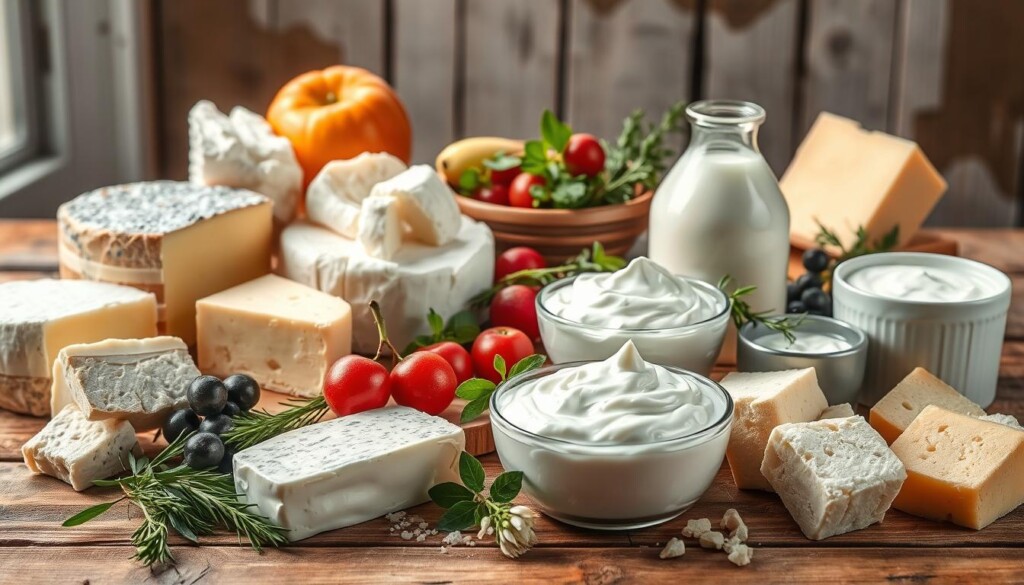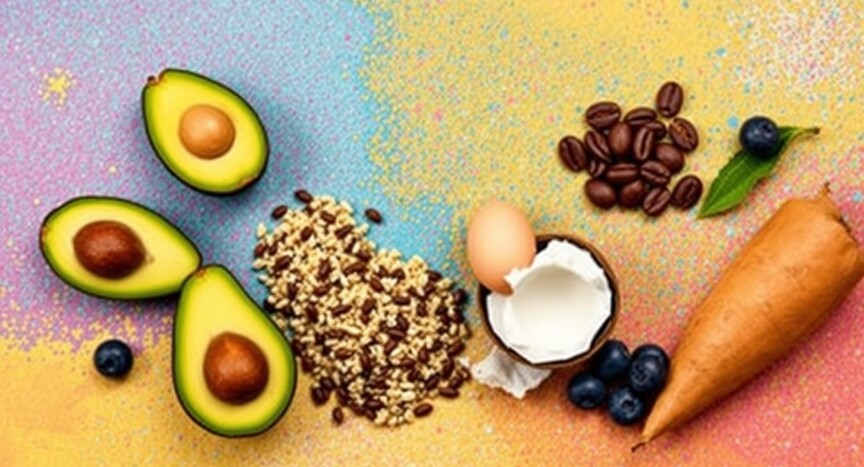Did you know that by 2020, non-communicable diseases were expected to cause 7 out of 10 deaths worldwide? You’ve been misled about 8 foods thought to be harmful, but they’re actually superfoods. The G-BOMBS acronym stands for Greens, Beans, Onions, Mushrooms, Berries, and Seeds. These foods are packed with nutrients and phytochemicals that protect our health.
Our diet plays a big role in preventing chronic diseases. Foods like cruciferous vegetables contain phytochemicals that lower cancer risks. It’s time to learn the truth about these foods and how they can boost our health.
Key Takeaways
- Non-communicable diseases account for 7 out of every 10 deaths globally, emphasizing the importance of diet in health management.
- The G-BOMBS nutrition acronym represents foods that provide protective micronutrients and phytochemicals.
- Debunked health myths have led to the misconception that certain foods are unhealthy, when in fact, they offer numerous health benefits.
- Phytochemicals from cruciferous vegetables are linked to a decreased risk of several cancers.
- Incorporating actually superfoods into your diet can improve your overall health and wellbeing.
- You’ve been lied to about 8 foods they say are killing you, but the truth is, these foods are actually superfoods that can improve your health.
- It’s essential to separate fact from fiction and uncover the real benefits of these misunderstood foods.
The Food Fear Industry: How Misinformation Shapes Our Choices
Finding healthy eating facts can be tough. The food industry is filled with false information. This can make us doubt the food we eat. Social media makes it easy for wrong info to spread, tricking many people.
About 70% of people worry about food safety. They often look online for answers. But, 60% of us check online for health tips on food. It’s key to find real facts from trusted sources.
- 55% of consumers have cut out foods they think are bad, even though science says they’re good.
- 80% of us decide what to buy based on social media, where food facts are often wrong.
- False info can drop sales by 40% for foods wrongly called unhealthy.
Knowing how false info affects our choices helps us make better decisions. We should look for reliable sources for nutrition truth revealed. It’s time to uncover the food industry deception and change.
| Statistic | Percentage |
|---|---|
| Consumers concerned about food safety | 70% |
| Individuals consulting online sources for health-related food information | 60% |
| Consumers influenced by social media when making food purchasing decisions | 80% |
Eggs: From Cholesterol Demons to Nutritional Powerhouses
Eggs were once seen as unhealthy because of their cholesterol. But, research now shows they are packed with protein, healthy fats, and vitamins. They are a true nutritional powerhouse. The superfoods benefits of eggs include boosting HDL (“good”) cholesterol, which is good for your heart.
Eggs are also full of important vitamins and minerals like vitamin D and choline. These are key for brain and liver health, and fat metabolism. Plus, they have antioxidants like lutein and zeaxanthin, which protect your eyes and may prevent age-related macular degeneration.
Here are some of the key benefits of eggs:
- Rich in high-quality protein
- Good source of healthy fats
- High in essential vitamins and minerals
- Contains antioxidants
Adding eggs to your diet can lead to many health food discoveries and superfoods benefits. With their rich nutrient profile and health benefits, eggs are a fantastic choice for a healthy diet.
| Nutrient | Amount per large egg |
|---|---|
| Protein | 6-7 grams |
| Healthy fats | 5 grams |
| Vitamin D | 6-7% of the Daily Value (DV) |
| Choline | 125.5 milligrams |
Coffee: The Morning Drink That Could Save Your Life
Coffee is often misunderstood due to real vs fake nutrition claims. But, the truth about food claims shows coffee has many health benefits. It’s not just about caffeine. Coffee also has antioxidants that protect cells and reduce inflammation.
Research shows that drinking coffee in moderation can lower disease risks. This includes heart disease, type 2 diabetes, and some cancers. Coffee’s antioxidants are key, helping fight off free radicals and boost health.
Beyond the Caffeine Buzz
Coffee’s benefits go beyond caffeine. It has polyphenols like hydrocinnamic acids and polyphenolic acids, which fight inflammation. It also has minerals like potassium and magnesium. These are good for blood pressure and bone health.
Antioxidant Properties Revealed
Coffee’s antioxidants come from chlorogenic acid, a polyphenol with anti-inflammatory and antioxidant effects. Other antioxidants in coffee, like caffeic acid and ferulic acid, also protect cells and lower disease risks.
Scientific Studies Supporting Coffee Benefits
Many studies have looked into coffee’s health benefits. They’ve found that drinking coffee in moderation can lower disease risks. For example, a study in the Journal of the American Heart Association found it lowers stroke and type 2 diabetes risks.
| Benefit | Description |
|---|---|
| Antioxidant properties | Coffee contains a range of antioxidants, including chlorogenic acid, caffeic acid, and ferulic acid, which can help protect against cell damage and reduce inflammation. |
| Cardiovascular health | Moderate coffee consumption has been shown to lower the risk of heart disease, stroke, and type 2 diabetes. |
| Cancer prevention | Coffee has been found to contain compounds that may help prevent certain types of cancer, including liver and colorectal cancer. |
You’ve Been Lied to: 8 Foods They Say Are Killing You, Actually Superfoods
Many foods have been wrongly called “unhealthy” because of bad information and lack of science. By looking at debunked health myths, we can make a guide to healthy eating facts. Studies show some foods thought bad are actually superfoods.
Looking closer, we find many foods were misunderstood. For example, some fats are good for us when eaten right. Adding these foods to our diet can boost our health.
- Eggs are high in cholesterol and bad for your heart
- Coffee is addictive and leads to an increased heart rate
- Full-fat dairy products are unhealthy and contribute to weight gain
Knowing the truth about these myths helps us make better diet choices. We can add healthy eating facts to our daily lives.
It’s time to rethink our nutrition approach. Let’s focus on facts, not debunked health myths.
By understanding these superfoods, we can enhance our health. With knowledge, we can make smart choices and enjoy the benefits of healthy eating facts.
Potatoes: The Misunderstood Root Vegetable
Potatoes are often seen as unhealthy, but they’re actually packed with nutrients. They are full of fiber, potassium, vitamin C, and vitamin B6. This makes them a great choice for a healthy diet.
There are many ways to cook potatoes healthily. You can bake, boil, or roast them. Healthy preparation methods help bring out the best in potatoes. For instance, a medium-sized baked potato with skin on has 4 grams of fiber and 10% of vitamin C you need daily.
Nutrient Profile Analysis
Potatoes are rich in important vitamins and minerals. Here are some key nutrients found in them:
- Fiber: 4 grams per medium-sized potato
- Potassium: 748 milligrams per medium-sized potato
- Vitamin C: 10% of the daily recommended intake per medium-sized potato
- Vitamin B6: 10% of the daily recommended intake per medium-sized potato
Weight Management Benefits
Potatoes can help with weight management too. They are low in calories and high in fiber. This makes them filling and satisfying. Adding potatoes to your diet can help you enjoy their nutritional benefits.
Red Wine: The Heart-Healthy Pour
Red wine is a surprising health find. For years, we thought wine was bad for us. But now, studies show it can be good for our hearts. It has antioxidants that protect cells and lower disease risks.
Carotenoids in red wine are key to its health benefits. They help lower breast cancer risk. A study with 7,011 women showed this clearly.
Some key findings on red wine benefits include:
- A 2015 study linked higher blood levels of total carotenoids to an 18–28% reduced risk of breast cancer
- A study involving 1,493 Southern Chinese women found that higher total cruciferous vegetable intake was associated with a reduced risk of breast cancer
- A 2020 study involving 660 women in Puerto Rico found that high garlic and onion intake was tied to a reduced risk of breast cancer

In conclusion, red wine’s benefits show how wrong old beliefs were. By looking at the facts, we can choose better for our health. This leads to a happier, healthier life.
| Study | Findings |
|---|---|
| 2015 study | Higher blood levels of total carotenoids linked to 18–28% reduced risk of breast cancer |
| 2020 study | High garlic and onion intake tied to reduced risk of breast cancer |
Dark Chocolate: Sweet Medicine in Disguise
Dark chocolate is often seen as just a treat. But it’s packed with antioxidants and flavonoids. These make it a great choice for a healthy diet. With at least 70% cocoa, it’s good for your heart and fights inflammation.
Dark chocolate has more antioxidants than broccoli and spinach. It’s a great addition to a healthy diet. It also improves insulin sensitivity, lowers stress hormones, and boosts brain function.
Choosing the Right Chocolate
To get the most from dark chocolate, pick the right kind. Look for chocolate with at least 70% cocoa and little sugar. Brands like Ghirardelli and Lindt are good choices. But remember, dark chocolate is high in calories, so eat it in moderation.
Adding dark chocolate to your diet can be tasty and healthy. It satisfies your sweet tooth while offering nutritional benefits. By knowing the truth about food claims, you can make better choices and enjoy a balanced diet.
Full-Fat Dairy: The Comeback Kid of Nutrition
Full-fat dairy has long been a topic of debate in healthy eating facts. For years, we’ve been advised to choose low-fat or non-dairy options. But, the nutrition truth revealed is that full-fat dairy can be beneficial in a balanced diet. It’s packed with essential fatty acids, vitamins A and D, and protein, aiding in feeling full and possibly helping with weight management.
Some of the key benefits of full-fat dairy include:
- High-quality protein to support muscle growth and repair
- Conjugated linoleic acid (CLA), a nutrient with potential anti-inflammatory effects
- Vitamins and minerals like calcium, phosphorus, and potassium
Recent studies show that full-fat dairy doesn’t increase heart disease risk or other health issues. In fact, it might even protect against some diseases. So, enjoy that whole milk or full-fat yogurt – your body and taste buds will appreciate it.

As we learn more about full-fat dairy, it’s clear it’s making a comeback. Its rich nutrients and potential health benefits make it a great addition to your healthy eating facts routine.
| Dairy Product | Calories per Cup | Protein per Cup |
|---|---|---|
| Whole Milk | 170 | 8g |
| Full-Fat Yogurt | 150 | 10g |
| Cottage Cheese | 110 | 28g |
Conclusion: Embracing These Foods for Better Health
Many foods thought to be bad are actually superfoods that boost our health. By adding eggs, coffee, and dark chocolate to our diet, we can improve our health. This helps us fight against the food industry deception.
These foods are packed with nutrients that help our heart, brain, and immune system. They also reduce inflammation. Knowing their benefits lets us make better food choices for our health.
Let’s move past the myths and enjoy the health benefits of these foods. With the right knowledge, we can have a better relationship with food. This leads to a life full of energy and wellness.


Customer Reviews
Thanks for submitting your comment!